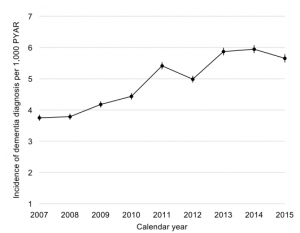A comparison of new dementia diagnosis rates across ethnic groups in UK primary care
By Nathan Davies, on 31 August 2018
In this post Tra Pham discusses her recent work with colleagues from the department, Division of Psychiatry and King’s College London on new diagnoses of dementia and the differences among ethnic groups.
Around 46.8 million people worldwide have dementia; this is expected to rise to 131.5 million by 2050. Recent studies have reported stable or declining rates of new dementia cases overtime.
In 2010, members of our department (Rait et al, 2010, BMJ) conducted a primary care database study to investigate survival of people with a diagnosis of dementia, and reported a stable rate of new dementia diagnoses in UK primary care between 1990 and 2007. We know little about the differences in the likelihood of receiving a dementia diagnosis among different ethnic groups. Some evidence has indicated that people from Black and Minor Ethnic (BME) groups present at services (i.e. GP) later in their illness. Therefore, compared with the White British ethnic group, BME dementia patients may have less access to timely diagnosis. This can prevent them from benefiting from early intervention and treatment which may help slow the progression of the disease.
Our recent study reported the overall rate of new dementia diagnoses in UK primary care between 2007 and 2015. In addition, we reported, for the first time, the rate by White, Asian, and Black ethnic groups. Pulling together current best evidence of new dementia cases in the community and the 2015 UK census data, we estimated the proportion of White and Black people developing dementia who received a diagnosis in 2015. Our hypothesis was that there would be a smaller proportion of Black people with dementia who were diagnosed compared with people from the White ethnic group.
We analysed data of 2.5 million older people from The Health Improvement Network (THIN) database. 66,083 new cases of dementia were identified, which corresponded to an increased rate of new dementia diagnoses between 2007 and 2015 (Figure 1).

Figure 1 Rate of new dementia diagnoses per 1,000 person-years at risk (PYAR) by calendar year in The Health Improvement Network (THIN) UK primary care database.
Compared with White women, the dementia diagnosis rate was 18% lower among Asian women and 25% higher among Black women. This rate was 28% higher among Black men and 12% lower in Asian men, relative to White men. Based on diagnosis rates in THIN data and projections of new dementia cases from community cohort studies, we estimated that 42% of Black men developing dementia in 2015 were diagnosed, compared with 53% of White men.
The results thus suggest that the rates of people receiving a diagnosis may be lower than the actual rates of developing dementia in certain groups, particularly among Black men. There are several possible explanations for this. It could indicate that Black men experience barriers to accessing health services or receiving a diagnosis. GPs may be more reluctant to diagnose dementia in BME groups especially if culturally competent tests are unavailable. GPs and families might also be reluctant to name dementia in communities where more stigma is associated with a diagnosis.
Our study emphasises the need for service improvement targeting BME groups who might be facing barriers to accessing health care services and getting a dementia diagnosis. GPs should be equipped with culturally appropriate assessment tools in order to make a timely diagnosis of dementia for BME patients.
Our findings also highlight the importance of raising awareness of the benefits of getting a timely diagnosis of dementia, particularly in people from minority ethnic groups who may be more at risk of dementia. Timely diagnosis of dementia can lead to more targeted support and enable GPs to provide appropriate patient care management. These benefits can be explained to the patients by family and friends, as well as professionals such as nurses and social workers. They can also help the patients to overcome the fears of talking about dementia. Faith and community groups can contribute to ensuring that local dementia services are accessible to all.
This study is conducted in collaboration with King’s College London. This work is supported by The Dunhill Medical Trust [grant number R530/1116]. Our article and relevant references can be found at:
Pham TM, Petersen I, Walters K, Raine R, Manthorpe J, Mukadam N, Cooper C (2018). Trends in dementia diagnosis rates in UK ethnic groups: analysis of UK primary care data. Clinical Epidemiology (10): 949-960. doi: 10.2147/CLEP.S152647.
 Close
Close

